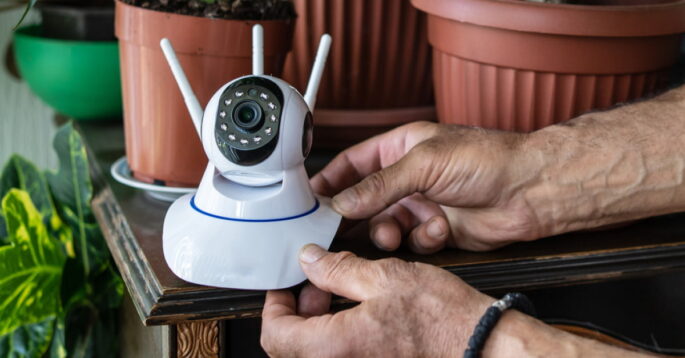Cameras in nursing homes continue to expose nursing home abuse, and over a dozen states have passed laws allowing them in residents’ rooms.
For example, 78-year-old nursing home resident Esther Piskor was verbally and physically abused by staff members at a nursing home. A hidden camera captured the incidents — and the horrifying footage sent two staff members to jail.
However, many nursing homes remain opposed to allowing cameras due to privacy concerns. Learn more about nursing home cameras and see what action you can take.
Can You Put a Camera in a Nursing Home?
Due to varying laws in each state, whether you can put a camera in your loved one’s room often depends on the policies of the nursing home.
Most facilities use security cameras to monitor common areas, parking lots, and exits. Cameras may also be installed in the residents’ rooms in some cases. In-room cameras provide an extra layer of security for family members who may be afraid of nursing home abuse.
However, not every nursing home allows these cameras, fearing the cameras invade the privacy of staff members and other residents.
What States Allow Cameras in Nursing Homes?
As of 2024, more than a dozen states allow private cameras in nursing homes.
States that may allow cameras in nursing homes include:
- Arizona
- Connecticut
- Illinois
- Kansas
- Louisiana
- Maryland
- Minnesota
- Missouri
- New Jersey
- New Mexico
- Ohio
- Oklahoma
- Texas
- Utah
- Washington
- Wisconsin
Many other states are considering laws that would allow nursing home cameras in residents’ rooms. Be mindful that states often require signed consent forms from your family member and their roommates.
Some states use additional guidelines and programs to keep residents safe. For example, New Jersey loans out hidden cameras to families for 30-day periods if they suspect their loved one is being abused. Wisconsin has a similar program.
While these measures contribute to residents’ safety, regulations vary by state, which may result in the removal or denial of camera installations. For example, nursing homes in Maryland are permitted to deny requests for in-room cameras.
Should I Use Cameras in Nursing Homes?
Before deciding to use a nursing home camera, you should weigh the pros and cons.
Pros of Cameras in Nursing Homes
Cameras can catch abusers in the act and give you the proof to report nursing home abuse.
Here are some cases where a camera exposed nursing home abuse:
- In 2012, hidden camera footage caught two nursing home staff members shoving a latex glove into the mouth of a 98-year-old resident in Oklahoma. As a result, Oklahoma now legally allows families to use cameras in nursing homes.
- In 2019, a camera caught a health care worker physically abusing a resident by twisting their arm. In this case, the camera had been installed with the nursing home’s permission. The worker was not a nursing home staff member but worked for a third-party company that drew blood. The employee lost his job and faced criminal charges.
- A secret camera recorded a nursing home staff member sexually abusing a disabled resident in July 2019, according to court documents. The staff member faced charges of second-degree rape.
Cameras can also reassure families that their loved ones are being cared for. This was the case in New Jersey, where a woman used a camera to monitor her dying husband. Instead of catching abuse, she had peace of mind knowing the staff was meeting her husband’s needs.
Cons of Cameras in Nursing Homes
Some nursing homes resist the idea of using cameras in residents’ rooms due to privacy concerns.
Nursing home cameras may invade the privacy of:
- The resident: Some residents may not want a camera to monitor their activities at all times. Depending on where the camera is set up, it could catch residents as they change, bathe, or use a bedpan.
- Their roommates: Not all nursing home facilities have individual rooms for each resident. Nursing home cameras intended to monitor a resident could also catch roommates without their consent.
- The staff: Cameras may increase staff resentment and also lead to false accusations. For example, if a camera catches a staff member moving a resident’s object, it may appear they stole it when they only moved it off-screen.
Further, a resident can be removed from the nursing home if an unauthorized camera is found. You might also face charges depending on local and state laws.
The Future of Cameras to Protect Residents From Nursing Home Abuse
As more laws about nursing home cameras are considered, lawmakers must strike a balance between the safety and privacy of residents.
If you want a camera installed in a nursing home, consult:
- Your loved ones: Explain why you feel a camera is necessary and how it can be helpful.
- Roommates: Getting the consent of roommates and their families can help ease any privacy concerns. Explain how having a camera in the room can also protect the roommate from abuse or neglect.
- Local legal advocates: Getting in touch with nursing home abuse lawyers may help you understand what your rights are in relation to nursing home cameras — including hidden ones.
- Nursing home staff: Some facilities may allow you to install a camera if you ask. Explain your concerns and why you feel a camera is needed.
If you believe your loved one in a nursing home is being abused, our team at the Nursing Home Abuse Center can help you pursue legal options. Find out if you are eligible with a free case review now.

